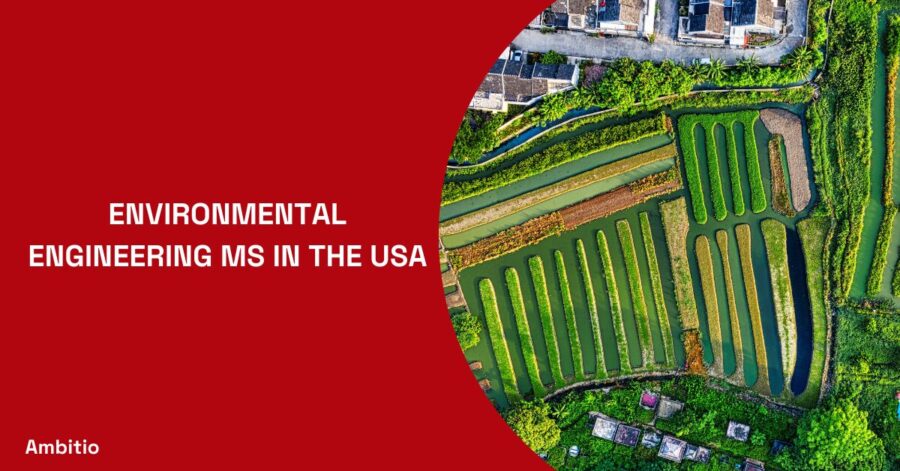17 December 2024
6 minutes read
Environmental Engineering MS in the USA

Key Takeaways
- Diverse Specializations: Choose from specializations like renewable energy and waste management
- Research and Experience: Engage in advanced research and practical fieldwork.
- Interdisciplinary Approach: Benefit from a curriculum that integrates multiple engineering disciplines.
- Career Opportunities: Access a wide range of roles in environmental engineering sectors.
- Global Impact: Contribute to worldwide sustainability and environmental protection efforts.
Introduction
In the realm of engineering, environmental engineering stands out as a beacon of hope and innovation, especially pertinent in the current era.
The field is not just about dealing with pollution or waste management; it’s about pioneering sustainable solutions for a better tomorrow.
As we step into 2024, the significance of pursuing a degree in environmental engineering in the USA has never been more pronounced.
This guide dives deep into the MS in Environmental Engineering programs offered by top universities and colleges in the USA, providing insights into what makes these programs vital for aspiring engineers and the planet alike.
MS in Environmental Engineering in the USA – Program Overview

- Program Duration:
- Typically a 2-year full-time program.
- Part-time options may extend the duration.
- Core Curriculum:
- Fundamental courses in environmental engineering principles.
- Subjects like water and wastewater treatment, air quality control, waste management, and sustainable engineering.
- Advanced Specializations:
- Options to specialize in areas like renewable energy, environmental sustainability, or hazardous waste management.
- Involves advanced coursework and research in the chosen specialization.
- Research-Oriented Learning:
- Emphasis on research projects, often with opportunities to work in cutting-edge university labs.
- Collaboration with faculty on ongoing environmental engineering research.
- Practical and Laboratory Work:
- Hands-on experience through labs, workshops, and fieldwork.
- Real-world problem-solving in environmental contexts.
- Interdisciplinary Approach:
- Courses often intersect with civil engineering, chemical engineering, and environmental science.
- Encourages a broad perspective on environmental challenges.
- Thesis or Non-Thesis Options:
- Programs typically offer a thesis (research-oriented) or a non-thesis (coursework-oriented) track.
- The thesis track involves a significant research project, while the non-thesis track focuses more on practical experience.
- Professional Development:
- Opportunities for internships and cooperative education with industry partners.
- Focus on developing skills for the job market, such as project management and technical communication.
- Global and Ethical Perspective:
- Coursework often includes global environmental issues and sustainable practices.
- Ethical considerations in environmental engineering decisions.
- Accreditation:
- Programs are usually accredited by relevant bodies such as ABET (Accreditation Board for Engineering and Technology).
- Ensures the quality and industry relevance of the program.
Top Universities for MS in Environmental Engineering in the USA
| University Name | Location | National Ranking | Tuition Fees (approx.) | Program Highlights | Unique Offerings |
|---|---|---|---|---|---|
| Massachusetts Institute of Technology (MIT) | Cambridge, MA | #1 | $53,790 per year | Interdisciplinary approach, state-of-the-art research facilities | Partnerships with leading environmental agencies |
| Stanford University | Stanford, CA | #2 | $53,529 per year | Focus on sustainable design and innovation | Opportunities for entrepreneurship in environmental solutions |
| University of California, Berkeley | Berkeley, CA | #3 | $43,176 per year (in-state), $55,160 per year (out-of-state) | Strong emphasis on water and wastewater engineering | Extensive alumni network and industry connections |
| California Institute of Technology (Caltech) | Pasadena, CA | #4 | $54,600 per year | Advanced research in environmental chemistry and pollution control | Small class sizes for personalized learning |
| University of Michigan | Ann Arbor, MI | #5 | $26,336 per year (in-state), $51,126 per year (out-of-state) | Comprehensive curriculum covering all aspects of environmental engineering | Strong focus on sustainable engineering practices |

Eligibility and Admission Requirements for MS in Environmental Engineering
- Undergraduate Degree:
- Bachelor’s degree in engineering, environmental science, or a closely related field.
- Accredited by a recognized institution.
- Minimum GPA:
- Generally, a minimum GPA of 3.0 on a 4.0 scale is required.
- Some programs may have higher GPA requirements.
- GRE Scores:
- Required by most universities, especially for quantitative, verbal, and analytical writing sections.
- Specific score requirements can vary by program.
- English Language Proficiency (for non-native speakers):
- TOEFL or IELTS scores to demonstrate proficiency in English.
- Minimum score requirements: TOEFL (80-100), IELTS (6.5-7.5), varying by university.
- Letters of Recommendation:
- Typically 2-3 letters, preferably from academic advisors, professors, or professional supervisors.
- Should attest to the applicant’s academic and research abilities.
- Statement of Purpose (SOP):
- A comprehensive essay outlining the applicant’s academic interests, career goals, and reasons for choosing the program.
- Should reflect a clear understanding of the environmental engineering field.
- Resume/CV:
- Detailed resume or CV showcasing academic background, research experiences, publications (if any), and relevant work experience.
- Detailed resume or CV showcasing academic background, research experiences, publications (if any), and relevant work experience.
- Research Experience (Preferred, not mandatory):
- Prior research experience in a related field can strengthen the application.
- Involvement in projects, publications, or academic research work.
- Prerequisite Courses:
- Some programs may require the completion of prerequisite courses, especially for applicants from non-engineering backgrounds.
- Courses in mathematics, physics, or basic engineering principles.
- Interview (if required):
- Some programs conduct interviews as part of the admissions process, either in person or virtually.
- Some programs conduct interviews as part of the admissions process, either in person or virtually.
- Financial Documentation (for international students):
- Proof of financial support to cover tuition and living expenses during the study period.
- Proof of financial support to cover tuition and living expenses during the study period.
Career Opportunities with an MS in Environmental Engineering

| Job Title | Responsibilities | Average Salary Range (Annually) |
|---|---|---|
| Environmental Consultant | Advising on environmental regulations, conducting impact assessments, and developing sustainability strategies. | $55,000 – $85,000 |
| Water Project Manager | Overseeing water-related projects, including water quality management and wastewater treatment systems. | $70,000 – $100,000 |
| Air Quality Engineer | Monitoring and controlling air pollution, developing air quality management plans. | $60,000 – $90,000 |
| Environmental Health and Safety Manager | Ensuring workplace environmental compliance, and managing health and safety protocols. | $65,000 – $95,000 |
| Waste Management Engineer | Designing and managing waste disposal systems, and developing recycling and waste reduction strategies. | $60,000 – $85,000 |
| Sustainable Design Engineer | Creating environmentally sustainable designs in construction or product development. | $68,000 – $100,000 |
| Environmental Policy Analyst | Researching and developing policies for environmental protection and conservation. | $55,000 – $80,000 |
| Renewable Energy Engineer | Designing and implementing renewable energy systems like solar, wind, or hydroelectric power. | $70,000 – $110,000 |
| Environmental Research Scientist | Researching environmental issues, such as climate change, biodiversity, or water resources. | $63,000 – $90,000 |
| Hazardous Waste Engineer | Managing hazardous waste materials, and developing containment and disposal methods. | $62,000 – $88,000 |
The best way to predict the future is to create it.
– Peter Drucker.
Understanding the Financial Aspect of MS in Environmental Engineering
| Aspect | Description | Estimated Range or Factor |
|---|---|---|
| Tuition Fees | The cost of the program itself varies significantly by institution and residency status. | $20,000 – $50,000 per year |
| Living Expenses | Includes accommodation, food, transportation, and other personal expenses. | $10,000 – $20,000 per year |
| Scholarships and Grants | Financial aid opportunities are offered by universities or external organizations. | Varies (full to partial coverage) |
| Research Assistantships | Paid positions offered by universities to assist with faculty research, often including tuition waivers. | Stipend + Tuition Waiver |
| Teaching Assistantships | Positions involving undergraduate teaching or assistance, usually providing a stipend and tuition reduction. | Stipend + Tuition Reduction |
| External Funding Opportunities | Funding from sources outside the university, like governmental or private scholarships. | Varies (full to partial coverage) |
| On-Campus Employment | Part-time work opportunities within the university, such as in libraries or administrative offices. | Hourly Wage Varies |
Did You Know ?
Graduates of MS in Environmental Engineering programs in the USA often find employment in sectors with some of the highest job satisfaction rates, reflecting the rewarding nature of contributing to environmental solutions.
Scholarship Opportunities for MS in Environmental Engineering
| Scholarship Name | Provided By | Details | Eligibility Criteria |
|---|---|---|---|
| Engineering Excellence Scholarship | Individual Universities | Merit-based scholarship for outstanding academic achievement. | High GPA, strong academic record in engineering or related fields. |
| Graduate Research Fellowship | Individual Universities | Funding for students engaged in environmental engineering research. | Enrollment in MS program, research proposal. |
| EPA STAR Fellowship | Environmental Protection Agency (EPA) | Supports research in environmental studies and engineering. | U.S. citizen or permanent resident, relevant research focus. |
| American Water Works Association Scholarships | American Water Works Association (AWWA) | Aimed at students focusing on water supply and treatment. | Membership in AWWA, commitment to the water sector. |
| Fulbright Program | U.S. Government | Offers international students opportunities to study in the USA. | Non-U.S. citizen, with strong academic and leadership potential. |
| Rotary Foundation Global Scholarship | Rotary Foundation | Funding for graduate studies, including environmental engineering. | Excellent leadership skills, and commitment to community service. |
| National Science Foundation (NSF) Research Fellowship | National Science Foundation (NSF) | Financial support for research-based graduate studies. | U.S. citizen or permanent resident, research focus in STEM fields. |
| Society of Women Engineers Scholarship | Society of Women Engineers | Encourages female students in engineering disciplines. | Female student, enrolled in engineering program. |
| NACME Scholarships | National Action Council for Minorities in Engineering (NACME) | Supports underrepresented minority students in engineering. | Minority student, enrolled in engineering program. |
| Environmental Consulting Firm Scholarship | Various Environmental Consulting Firms | Sponsored by firms for students interested in environmental consulting. | Interest in environmental consulting, and academic achievement. |
Conclusion
Exploring the MS in Environmental Engineering in the USA for 2024 reveals a path not just to education but to impactful change. These programs prepare students to be innovators in tackling global environmental challenges.
With opportunities in research, interdisciplinary learning, and practical experiences, graduates are poised to become key contributors to environmental sustainability.
As the world increasingly seeks skilled environmental engineers, these programs stand as crucial stepping stones for those committed to making a real difference.
Embark on a journey that merges innovation with impact. Join the ranks of those shaping a sustainable future by exploring your potential with an MS in Environmental Engineering.
Leverage Ambitio’s expertise to make informed decisions by crafting a shortlist that reflects your goals and values. Ambitio Shortlist Builder provides you with the insights and data needed to make choices that are not just good, but great for your future.
FAQs
What are the career prospects after completing an MS in Environmental Engineering in the USA?
After obtaining an MS in Environmental Engineering, graduates can pursue careers in areas like sustainable design, waste management, water treatment, environmental consultancy, and government agencies. The degree opens doors to advanced roles in both the public and private sectors.
Are there scholarships available for international students in these programs?
Yes, many universities in the USA offer scholarships and financial aid to international students. These can be merit-based, need-based, or specific to certain countries or regions.
Do I need a background in engineering to pursue an MS in Environmental Engineering?
While a background in engineering is beneficial, many programs also accept students from related fields such as environmental science, chemistry, or geology, provided they meet other admission criteria.
How important is hands-on experience in these programs?
Hands-on experience is crucial in environmental engineering programs. It includes internships, cooperative education programs, and participation in research projects, which are integral to understanding and solving real-world environmental problems.
Can I pursue a Ph.D. after completing my MS in Environmental Engineering?
Absolutely. An MS in Environmental Engineering provides a solid foundation for those interested in further academic research and pursuing a Ph.D. in environmental engineering or related fields.
What is the average duration of MS in Environmental Engineering programs in the USA?
The average duration of these programs is typically two years, but it can vary depending on the university and whether the student is enrolled full-time or part-time.

You can study at top universities worldwide!
Get expert tips and tricks to get into top universities with a free expert session.
Book Your Free 30-Minute Session Now! Book a call now




























